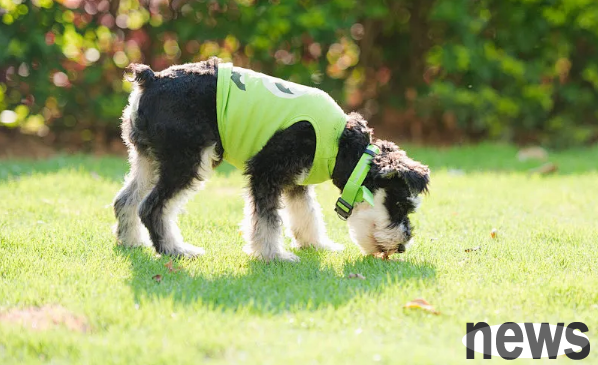I don’t know if you have noticed in life that some dogs seem to be unable to resist the temptation of grass, and they have to take a bite as they slid around, but I wonder if you have ever been curious about why this is?

01
Guessing about dogs eating grass
There are many speculations about why dogs eat grass. Many people think that when dogs eat grass, they are trying to make themselves vomit. They think it is an instinctive behavior, and dogs do it to get rid of what they shouldn’t be eating.
Some pet owners believe that dogs eat grass indicates stomach upset or intestinal problems in their puppy.
Others believe that grass contains some essential nutrients that their dogs instinctively know they need, or that grass provides much-needed fiber that helps to pass food through the dog's gastrointestinal tract. They believe that grass can be used as a laxative to help constipated dogs defecate.
But what is the real science behind dogs eating grass?
There are many speculations and theories, but there is limited research on why dogs eat grass. So the truth is...no one knows for sure. However, scientists have formed some theories and have overturned some rumors based on the research we have done.
02
Five reasons for dogs to eat grass
Instinctual behavior
Some scientists speculate that eating grass is an instinctual behavior of dogs evolved from wolf ancestors. We learned from studies of wolves that 2-10% of their stomach contents may contain plant material. Wild canines (from the canine family, including wolves, jackals, foxes and coyotes) have also been observed to eat grass. meeting. Only by perceiving various emotions can they control it in one step.
Normal Behavior
In another 2007 study, researchers found that grazing behavior was affected by the degree of hunger in dogs and the time of day. When the dog finishes eating, the number of times he eats grazing decreases, rather than the number of times he eats grazing increases. Grazing was also less frequent later that day. Researchers believe that eating grass is a normal behavior for dogs and does not indicate an underlying disease.
Soassing discomfort
A study fed a group of dogs with a diet containing fructose oligosaccharides. Another group of dogs were fed a standard diet. Fructose oligosaccharides are extracted from beets and enter the large intestine without digestion, where they ferment.
A large amount of fructose oligosaccharides can lead to watery and loose stools. Dogs fed the standard diet eat grass more times than FOS dogs with diarrhea. This means that dogs with gastrointestinal discomfort are actually unlikely to eat grass.
However, in this particular study, diarrhea originated in the large intestine, so it does not give us a deep understanding of the grass-eating behavior of dogs with stomach or small gastrointestinal discomfort.
Curiosity
Dogs, especially young dogs, often explore with their mouths. Eating grass may be something they try, just like some kids eating dirt. Some dogs may learn to like the taste of grass.
Following of pet owners
Other dogs may have learned that their pet owners pay more attention to them when they eat grass. You can talk more to your dog, or provide dog snacks to stop eating grass and eat snacks instead.
Sometimes, pet parents will pull their dog away from a grassy field. This limitation may stimulate the dog to eat any grass immediately after discovering it - it is also a rebellious psychology. In 2007, in 709 cases of grass, only 5 cases of vomiting. The study concluded that eating grass from dogs does not cause vomiting.
Puppies eat more grass
In another study of 1,571 respondents, it was also found that younger dogs eat more grass than older dogs.
Dogs eat grass and basically won’t cause vomiting, but should you let your dog eat grass? Is eating grass safe for dogs?
Next, let’s talk about the various safety risks of eating grass. The following are the most common ones.
04
Safety risks of dogs eating grass
1. Pet parents need to make sure that the grass their dogs eat does not contain any insecticides, which can poison dogs. If you suspect your dog has eaten grass treated with pesticides, take them to your local veterinary clinic for treatment immediately.
Dogs that consume pesticide-treated grass may show the following signs:
· Excessive salivation
· Nausea
· Dizziness
· Decreased appetite
2, Feces
grass may be contaminated with feces from other dogs and animals. Eating grass contaminated with feces can make your dog sick.
Some intestinal diseases, such as parvovirus, are transmitted through the fecal oral route. Peruvial virus can cause severe gastrointestinal disease in unvaccinated dogs and puppies. Some dogs may die from this disease.
Fat from other dogs and animals may also contain eggs or larvae from intestinal parasites. Dogs with intestinal parasites may lose weight and develop diarrhea.
Generally speaking, dogs should take antiworming agents every month, commonly found in dogs' monthly heartworm preventive agents, and undergo regular fecal testing to find intestinal parasites. Some intestinal parasites need to be treated with different medications.
05
How to stop a dog from eating grass
l When walking on the grass, please tie your dog with a rope.
l Schedule your dog walking time immediately after a meal when your dog's stomach is full.
l Let your dog enter the grass later in the day.
l Use positive reinforcement and strengthen alternative behavior. Every time your dog tries to eat grass, calmly interrupt this behavior (by diverting attention rather than scolding) and ask your dog to perform another behavior. It could be touching your hand to get rewards or chasing their ball.